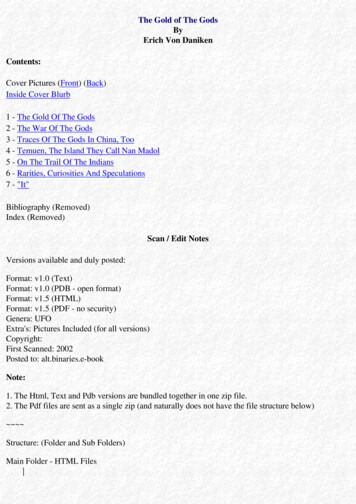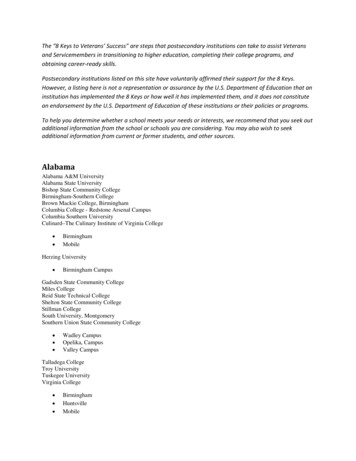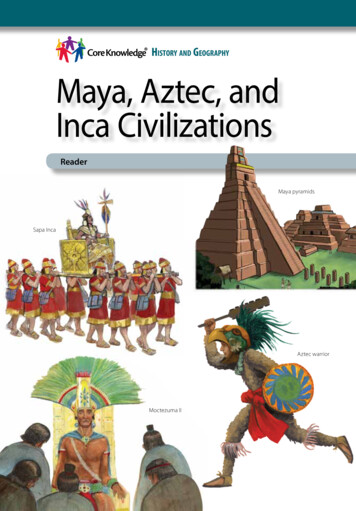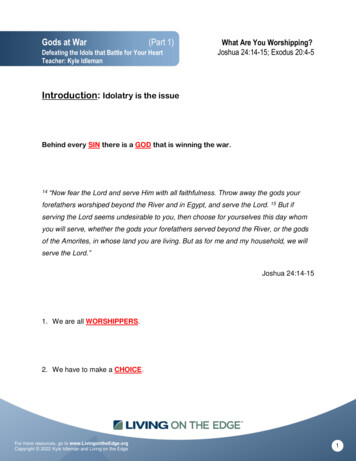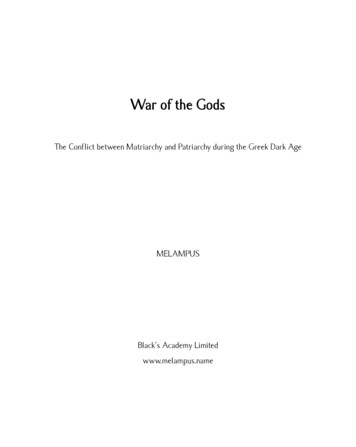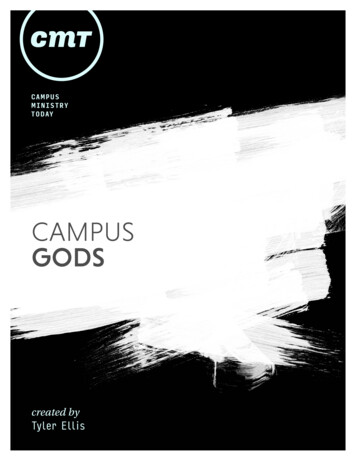
Transcription
CAMPUSGODScreated byTyler Ellis
Campus godsCreated by // Tyler Ellis“Campus gods” is a 7-lesson study suitable for small groups, oneon-ones or for personal study, inspired by Guy Chmieleski’s book bythe same title (used by permission). Each lesson addresses an idolthat students are particularly prone to worshiping on campus. Theseinclude the gods of achievement, sex, substances and information.Lesson guides contain scripture readings as well as excerpts fromcommendable authors such as Kyle Idleman, Randy Alcorn, and CraigGroeschel. Helpful questions are also provided for group discussionor personal journaling and application.Ultimately, as students gain a new perspective on idolatry, theheart as a battleground, and the jealousy of God, they will grow inunderstanding and in passionate resolve to love the Lord their Godwith all their heart, soul, mind and strength.Table of ContentsLESSON 1 – THE BATTLEGROUND OF THE GODSLESSON 2 – OUR JEALOUS GODLESSON 3 – THE GOD OF ACHIEVEMENTLESSON 4 – THE GOD OF SEXLESSON 5 – THE GOD OF INFORMATIONLESSON 6 – THE GOD OF SUBSTANCELESSON 7 – THE GOD OF MECMT is a ministry of the Center for Mission Mobilization. campusministry.org // mobilization.org2
LESSON 1 – THE BATTLEGROUND OF THE GODSDiscussion Questions1.See if your group can collectively list the Ten Commandments. (For help, see Exodus 20:1-17)2.While most people will admit to lying, stealing, and dishonoring their parents, why mightthe average person assume they haven’t broken the first commandment? (Probing Question:What comes to mind when you think of idolatry?)3.Martin Luther once said you can’t violate the last nine commandments without breaking thefirst one first. What do you suppose Luther meant by that statement?ReadingIn his book, gods at war, Kyle Idleman says, “What if it’s not about statues? What if the gods ofhere and now are not cosmic deities with strange names? What if they take identities that areso ordinary that we don’t recognize them as gods at all? What if we do our “kneeling” and our“bowing” with our imaginations, our checkbooks, our search engines, our calendars? What if Itold you that every sin you are struggling with, every discouragement you are dealing with, eventhe lack of purpose you’re living with is because of idolatry? Anything at all can become an idolonce it becomes a substitute for God in our lives. Anything that becomes the purpose or drivingforce in your life probably points back to idolatry of some kind. Idolatry is always the issue. It’sthe trunk of the tree, and all other problems are just branches.”Discussion Questions4.Imagine your heart as a battleground, at the center of which sits a throne. In light of KyleIdleman’s quotation, what idols can you think of that compete for the throne of people’shearts today?5.Briefly share an example or personal story of a time you or someone you know struggled witha temptation and tried to treat the symptoms instead of the deeper issue? What happened inthe long run?ReadingDiscuss what the following scriptures have to say about the heart and why they are relevant tothe topic of idolatry: Proverbs 4:23; Matthew 12:33-35; 22:37-38.CMT is a ministry of the Center for Mission Mobilization. campusministry.org // mobilization.org3
LESSON 2 – OUR JEALOUS GODDiscussion Questions1.By way of review, have someone in your group recap how we today can actually break thecommandment not to worship idols, without literally bowing down before a graven image.2.How would you define jealousy?3.While we generally think of jealousy as harmful or sinful, there are scenarios in whichjealousy can be a good thing. Imagine if you were married and someone started a rumorthat you were having an affair. What would it say about your spouse if they heard the rumor,believed it, but weren’t jealous?4.Read Exodus 20:4-5. Then read 34:14 and discuss how it elaborates on the jealousy of God.Reading“For the LORD your God is a consuming fire, a jealous God” (Deuteronomy 4:24). In the Bible,the words jealous and zealous are basically interchangeable – it’s the same Hebrew word in theoriginal texts. We think of zeal as being intense enthusiasm. That idea captures why God is sopossessive about us: he is, as he says, a consuming fire of passion for us. We need to remember,as we talk about God’s intolerance of idolatry, that everything comes back to a passionate lovethat is so immense, so powerful, that it burns hotter than a billion suns. The only relationshipGod is interested in is one that is exclusive and completely committed. He is not interestedin an “open relationship” with you. God is jealous for your heart, not because he is petty orinsecure, but because he loves you. You can’t understand the seriousness of idolatry withoutunderstanding the jealousy of God. And you can’t understand his jealousy without someunderstanding of his relentless, powerful love for you, because they are intertwined.” Kyle Idleman, gods at warDiscussion Questions5.The Bible uses a powerful analogy to describe what idolatry feels like to God. The prophetscompare it to a cheating spouse. How does this analogy change the way you view yourself,God, and His moral guidelines?6.Have someone in your group quote John 3:16 (or read if necessary). The event of the coming ofJesus represents just how far God is willing to go to win your heart. Why is it important thatwe understand the reason Jesus came to earth, before we move on in our series to addressspecific idols we struggle with today?CMT is a ministry of the Center for Mission Mobilization. campusministry.org // mobilization.org4
LESSON 3 – THE GOD OF ACHIEVEMENTDiscussion Questions1.Bowing down to the god of achievement is one of the most common forms of idolatry oncampus. As you read characteristics of this god, consider sharing with your group, one you’vestruggled with: You’re more concerned about making an “A” than actually learning. Your participation in anything hinges on whether there are opportunities for you to be a leader. You allow your demanding schedule to come before your health (proper food, exercise, sleep). You’re obsessed with winning and you’re slow to celebrate the successes of others. You don’t really know what contentment feels like. Your relationships are superficial because you use people in order to get what you want. Your feelings of stress and anxiety seem like a way of life. You’re gradually forming addictions and/or have even contemplated suicide. You’re prone to neglect family, friends, church, Bible reading, and prayer. You view salvation as something to be achieved, as if Heaven depends on your spiritual résumé. Your identity is tied to your achievements rather than the thoughts and feelings God has for you.2.Discuss what Walker Percy and Jesus are and are not saying about achievement in thequotes below:“You can get all A’s and still flunk life.” Walker Percy“What good is it for someone to gain the whole world, yet forfeit their soul? Jesus (Mark 8:36)Reading“The word success is not found very frequently in the Scriptures, but one of the closest biblicalequivalents is the word blessed. Jesus gives an in-depth portrait of what it means to be blessedwhen he begins the Sermon on the Mount.” Kyle Idleman, gods at warThe order of the beatitudes is very important. Jesus begins by saying, “Blessed are the poor inspirit ” (Matthew 5:3) In other words, Jesus is saying, “Successful are those who are humbleenough to ask for help.”An interview with a college student (adapted from The Fuel and the Flame, by Steve Shadrach): INTERVIEWER: “So why did you come to college?” STUDENT: “Well, I’m here because I want to get a good education.” INTERVIEWER: “Okay but why do you want to get a good education?”CMT is a ministry of the Center for Mission Mobilization. campusministry.org // mobilization.org5
STUDENT: “Mmmm. Well because I want to get a good job.”INTERVIEWER: “A good job, huh? Why is it that you want to get a good job?”STUDENT: “I admit it, I want a good job so I can get a better salary.”INTERVIEWER: “Well, why would you want a better salary?”STUDENT: “I see where you’re going with this!”“Goals of advancement in the world are not necessarily sinful unless they become idols. The realquestion is, what is your motivation? Is it for your glory or God’s?” Kyle Idleman, gods at war.Discussion Questions3.Was Jesus successful? How should the answer to this question shape the way weview achievement?4.Read, discuss, and pray together about what the following Scriptures have to offer pertainingto achievement: Colossians 3:23; Matthew 6:33; John 6:27; Philippians 3:4-9.CMT is a ministry of the Center for Mission Mobilization. campusministry.org // mobilization.org6
LESSON 4 – THE GOD OF SEXSex was not invented by Hollywood but by God. Genesis 3:1 says, “God saw all that he had made,and it was very good.” Sex was part of the “all” that was so good. Even after the fall of Adam andEve, God’s Word speaks openly of the pleasure of sex within marriage (Proverbs 5:18-19; Song ofSolomon 4:5; 7:1, 6-9).1 God created hormones and attraction, and designed our bodies to giveand receive pleasure.Sex is a gift from God. However, a gift can become a god when we love it more than the giver.1.How have you seen the god of sexual pleasure worshipped on campus or in your own life?Consider the gift of fire. In a stove, it heats our food. In a lantern, it lights our way. In afireplace, it warms our bodies. Yet when those same flames move outside their boundaries, whathappens? Horrible devastation. The most magnificent gifts of God, taken outside their Godintended boundaries, become utterly ruinous. So it is with sex. Its potential for great good has aflip side – potential for great evil.2When we walk inside God’s boundaries for sex, we demonstrate that the giver of sex is the objectof our worship. But when we walk outside God’s boundaries for sex, we demonstrate that the giftof sex is the object of our worship. This is a form of idolatry.The more we care about God, the more we will care about his blessings and boundaries for sex.Before we look at specific scriptures on the topic, there are two concepts that will be helpfulto understand: the definition of fornication and the meaning of sexual immorality. First, thedictionary defines fornication as “voluntary sexual intercourse between two unmarried personsor two persons not married to each other.” Second, sexual immorality comes from the Greekword porneia, from which we derive the word pornography. Porneia literally means anythingthat causes sexual arousal outside of marriage.32.Read the following scriptures and briefly discuss what they say about God’s boundaries forsex: 1 Thessalonians 4:3-8; 1 Corinthians 6:18; Ephesians 5:3; Hebrews 13:4.It’s important that we comprehend not only that God opposes sexual sin, but why he opposesit. Like guardrails on a highway, God’s boundaries aren’t given to deprive us of pleasure but toprotect us from harm, so as to ensure true pleasure.43.When we are confronted with a boundary from God, why does it help to understand themoral reason why behind the command?CMT is a ministry of the Center for Mission Mobilization. campusministry.org // mobilization.org7
A great deal of research has been done by social scientists on the subjects of pornography,premarital sex, and cohabitation. Here is a sobering list of consequences that can follow: Increased chances of disease.Increased chances of sexual dissatisfaction.Increased chances of rape.Increased chances of domestic violence.Increased chances of kids without fathers.Increased chances of prostitution.Increased chances of abortion.Increased chances of suicide (or attempts).Increased chances of marital affairs & divorce.Increased chances of indifference toward God.All of us have offered sacrifices of some kind on the altar of sexual pleasure, obsessing over thegift rather than the giver. Amazingly, God’s forgiveness is readily available, though it may lookdifferent for the person who is a Christian and the person who is not.An illustration will help. Imagine a leaking pipe under a sink. What we can see on the outsideof the pipe are cracks dripping water on the floor. But what we cannot see on the inside of thepipe is a clog causing the cracks to spring up because of mounting pressure. This illustrates twothings: what sin is and what confession looks like. The clog represents our rebellious heart ofsin, which is essentially choosing our ways over God’s ways. The cracks represent our specificsins, which are manifestations of the heart (e.g. lying, stealing, sexual immorality, etc.). Just asthe clog should be repaired before the cracks, the general heart of sin should be confessed beforethe specific expressions of sin are addressed.According to the Christian worldview, God’s forgiveness is not achieved on the basis of ourability to repair the proverbial cracks, but rather received on the basis of Jesus’ ability to repairthe proverbial clog. So confession looks different for the person who is a Christian and for theperson who is not.The Christian who has looked to Jesus as leader and forgiver has confessed the sin of choosinghis or her ways over God’s ways. Having been forgiven and reconciled to God (see Acts 2:38), theChristian is then given God’s Holy Spirit to help repair the cracks as they confess specific sinsfrom that point on (see 1 John 1:9).4.Does the clogged pipe illustration make sense? What happens when people are misled to believethat God’s forgiveness is based on our ability to repair the proverbial cracks of specific sins?1. Alcorn, Randy. The Purity Principle.2. Alcorn, Randy. The Purity Principle.3. Groeschel, Craig. Weird.4. Alcorn, Randy. The Purity Principle.CMT is a ministry of the Center for Mission Mobilization. campusministry.org // mobilization.org8
LESSON 5 – THE GOD OF INFORMATIONInformation is a broad term. It encompasses knowledge and news, facts and fiction, claims andcreeds, research and reports, speculations and opinions, directions and instructions, statistics andhypotheses, jokes and trivia, stories and gossip, advice and more.It might sound strange to imagine that information, of all things, could become an idol that wouldcompete for the worship that belongs to the Lord God alone. But the fact is, we can become addictedto information. We can allow information to make us fearful, or arrogant, or apathetic. We can evenbe deceived by wrong information that can potentially lead us away from God altogether.In this study, we will consider characteristics of the god of information. Each characteristicincludes a few talking points, a question to discuss, and a scripture to look up and pray into yourlife as a group.TIME & WISDOM The average American spends 41% of their life staring at a screen. How has the god of information made you or someone you know a chronic time waster? Read and pray Psalm 90:12 into your life.FEAR & TRUST Media outlets pick and choose what stories to share and they often put their own slant onthe stories. As evidenced by websites like snopes.com, you can’t trust everything you read on the Internet. How has the god of information made you or someone you know fearful? Read and pray Philippians 4:6-7 into your life.ARROGANCE & HUMILITY It’s easy to think we know more than we do. If we become proud, it will be hard for us to welcomementors, ask for help, learn to interpret and apply information, and prepare for the future. How has the god of information made you or someone you know arrogant? Read and pray Proverbs 18:12 into your life.DECEPTION & TRUTH Truth isn’t determined by the majority vote. History is riddled with examples of beliefs held by entire cultures that were eventually shownto be wrong: the geocentric theory, bloodletting, eugenics, slave trade, segregation, and manyend-of-the-world predictions. When it comes to our search for truth concerning life’s biggest questions, our motives andmethods make a big difference. We must be willing to go where truth points at all cost. How has the god of information made you or someone you know deceived or close-minded? Read and pray 1 Thessalonians 5:21 into your life.CMT is a ministry of the Center for Mission Mobilization. campusministry.org // mobilization.org9
LESSON 6 – THE GOD OF SUBSTANCEThe success of college students is very much shaped by the experiments they choose to conduct,both inside and outside the classroom. While knowledge is the “substance” typically consumedin history, math and English courses, “Parties 101” is among the courses many students registerfor each semester, and the “substances” consumed are almost always drugs and alcohol. Asparties have become a trademark of the college experience, the god of substance has become aprominent altar on campus, at which many a student has offered sacrifices.According to www.collegedrinkingprevention.gov: Each year, 1,825 students die from alcohol-related unintentional injuries.97,000 students are victims of alcohol-related sexual assault or date rape.1 out of 4 students having unprotected sex say they were too intoxicated to know if they consented.About 25% of students report academic consequences of their drinking, including missingclass, falling behind, doing poorly on exams or papers, and receiving lower grades overall. 31% of students met criteria for a diagnosis of alcohol abuse.1Whether the use and abuse of substances is a temptation you struggle with today or not, whatvalue is there in examining the motives people have in consuming them, and the motives Godhas in regulating them?God’s motives behind regulating drugs and alcoholWhile some people believe the Bible condemns drinking all together, it is the opinion of theauthor of this Bible study that the Bible doesn’t condemn drinking but drunkenness. Twopassages worth reading on your own are Psalm 104:14-15 and John 2:1-12, the latter of whichJesus turns water to wine at a party. Ultimately, whether your interpretation leads you to abstainor partake in moderation, you should live in line with that interpretation, so as not to violateyour conscience.The Law All drug use, except for legitimate medicinal purposes, is illegal. That includes sharing andselling your own prescription drugs of every kind. If you are under the age of 21 in America, then it is illegal for you to drink alcohol. Read Romans 13:1. What we can conclude about God’s motives for regulating substances, as itpertains to the law?Controlling InfluenceCMT is a ministry of the Center for Mission Mobilization. campusministry.org // mobilization.org10
Liberty comes with responsibility, and the consequences of abuse are painfully real.2 Short-term effects of getting high or getting drunk: memory loss and vision impairment,slower muscular reaction, and increased error due to lack of attention and judgment. Long-term effects of getting high or getting drunk: depression, addiction, life-endingaccidents, suicide (attempts); unintended pregnancies, rape, domestic violence and crime; aswell as the loss of paychecks, scholarships, driving privileges, careers, and health. Read Proverbs 23:29-35 and Ephesians 5:18. What we can conclude about God’s motives forregulating substances, as it pertains to controlling influences?The Body While alcohol and tobacco use are not illegal, they are highly addictive and have been provento be major contributors to many diseases. Read 1 Corinthians 6:19-20. What we can conclude about God’s motives for regulatingsubstances, as it pertains to the body?Others It is not loving to drink in the face of someone who is underage, or strongly tempted by it, orhas a history of abusing it. Read Romans 14:20-21. What we can conclude about God’s motives for regulating substances,as it pertains to others?Wisdom Deciding to drink is a risk that must be calculated in light of many things, such as who you are,and the family you were born into. Read 1 Corinthians 10:23. What we can conclude about God’s motives for regulatingsubstances, as it pertains to wisdom?People’s motives behind consuming drugs and alcoholThere are a number of reasons people use and abuse substances. These include: to have fun with friends, to break the ice with the opposite sex, to cope with stress, toescape one’s present reality. There is also the desire to be liked and accepted. No one wants to feellike an outcast, so they do what everyone else is doing.3 The slang that people use for getting drunk also tells us a lot. People call it getting wasted or theytalk about getting hammered, wrecked, trashed, smashed, tanked, blitzed, and many other terms.4CMT is a ministry of the Center for Mission Mobilization. campusministry.org // mobilization.org11
Too Christian, Too PaganThere is an excellent book relevant to the topic at hand entitled, Too Christian, Too Pagan, inwhich Dick Staub proposes that some Christians are too Christian, and some are too pagan (i.e.irreligious).Christians become too Christian when They assume they cannot associate with people who aren’t also Christians. All their friends are Christians; they’re comfortable in their Christian subculture. They complain about the horrible things going on in our culture, and how evil people can be.Christians become too pagan when They reduce their faith to intellectual positions, but those beliefs never touch their everyday life. None of their closest friends are Christians. They conform to the corruption of the world.The balance we need is found in the Word of God and in the example of Jesus. The question isn’tdid Jesus go to parties (Matthew 9:10-12; 11:19) but why did he go to parties?What does it mean to be “in the world but not of the world?” (John 17:15)Personal Questions Are substances controlling you? Are you ready to surrender them to God? Do you need help?Are you more preoccupied with what others think of you than what God thinks of you?Are there situations you need to avoid because you’re too weak to resist?Where do you land on the scale of “Too Christian” or “Too Pagan”?CMT is a ministry of the Center for Mission Mobilization. campusministry.org // mobilization.org12
LESSON 7 – THE GOD OF MEReviewWith this lesson, we come to the end of our Campus gods series. We began the series bydiscussing how it’s possible to break the commandment that says not to worship idols, withoutliterally bowing down to a graven image.In an effort to “love God with all of our heart, soul, mind, and strength,” we’ve addressed someof the most common idols found particularly on the university campus, which compete for thethrone of students’ hearts today.1.In addition to the various gods we’ve discussed over the past several weeks (Achievement,Sex, Information, and Substance), what other gods would you add to the list?2.Do you agree with the statement: “all gods, in one way or another, attempt to take the OneTrue God off the throne and put me in His place”? Why or why not?The following reading is adapted from Kyle Idleman’s book, “gods at war.”The foundation of reality is that there is one God, and you are not him. Once that’s established, achoice must be made, and here it is: I know that there is the Lord God, the master of all creation.I also know there’s the god of me, the pretender to the throne. Whom will I serve?Will I worship God, and find my true place in this universe, the perfect place he has arranged forme? Or will I worship me and decide I can somehow come up with a better life than the Creatorcould design?What God once said to the King of Tyre, could be said to all of us today, at one point in our lives:“In the pride of your heart you say, ‘I am a god; I sit on the throne of a god’ But you are a meremortal and not a god, though you think you are as wise as a god” (Ezekiel 28:2).Broken CisternsREAD: Jeremiah 2:9,11-13Jeremiah summarizes the rebellion of God’s people into two sins: they have rejected God andhave instead turned to worthless idols. He explains to the people that when we put ourselves onthe throne instead of God, it’s like insisting on digging our own broken cisterns to drink out ofwhen there is a spring of fresh, living water flowing right beside us.1. CAMPUS GODS, by Guy Chmieleski2. Welcome to College, by Jonathan Morrow3. University of Destruction, by David Wheaton4. King of the Campus, by Stephen Lutz.CMT is a ministry of the Center for Mission Mobilization. campusministry.org // mobilization.org13
Cisterns were an important part of everyday life in Israel during Jeremiah’s time. In fact, thousandsof them have been uncovered by archaeologists. Rain was infrequent and scarce about half the year,so the people in those days would dig their cisterns and then line them with bricks and plaster tohold water. But cisterns were always breaking and losing water. Even when they didn’t break, thewater would often become stagnant or the supply would be inadequate.The people would have thought of Jeremiah’s metaphor as ridiculous. No one would ever choose acistern as their water source when a spring of crystal clear water was available. But that captures theridiculousness of idolatry. We choose a broken well with stagnant water, instead of the spring of freshwater. We look to something or someone to do for us what God was meant to do for us.3.Finish the following statements:Instead of looking to God as our source of comfort, we turn toInstead of looking to God as our source of significance, we turn toInstead of looking to God as our source of security, we look toInstead of looking to God as our source of joy, we look toInstead of looking to God as our source of hope, we look toInstead of looking to God as our source of truth, we look toThose things we look to for help aren’t necessarily bad or evil in and of themselves. In fact God mayuse them to accomplish his purpose, but the question is, have they become broken cisterns that weturn to instead of living water? Am I putting my hope in something that doesn’t hold water?The Living WaterREAD: John 4:13-14.So what are you thirsty for? Are you stressed out and thirsty for peace? Are you lonely and thirstyfor love? Are you bored and thirsty for purpose? Are you thirsty for acceptance? For validation?For significance? Are you just thirsty for something more? The god of me relentlessly calls us tochase after all these things. But ultimately we’re left more thirsty than ever.So here’s the invitation from Jesus: “Drink from me, and you’ll never thirst again.”4.As a result of this series, what have you learned about God? What have you learned aboutyourself? How does this affect your approach to daily living?Personal Application5.Based on what you have learned about God and yourself, what is God asking you to do? Whatis preventing you from doing this? How can our group help you take these steps?(Set a goal that is specific, attainable, and measurable).PrayerCMT is a ministry of the Center for Mission Mobilization. campusministry.org // mobilization.org14
“Campus gods” is a 7-lesson study suitable for small groups, one-on-ones or for personal study, inspired by Guy Chmieleski’s book by the same title (used by permission). Each lesson addresses an idol that students are particularly prone to worshiping on campus. These include the gods

